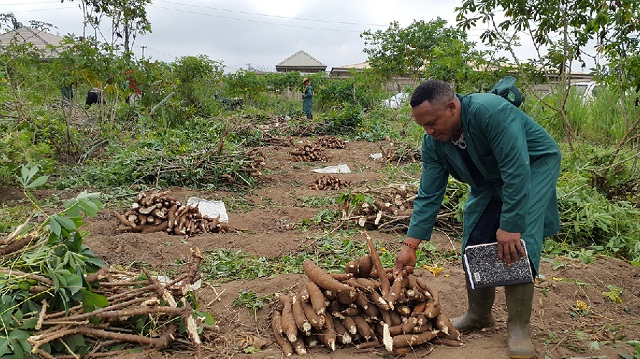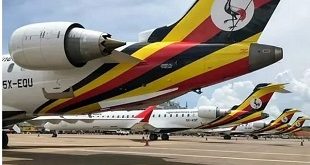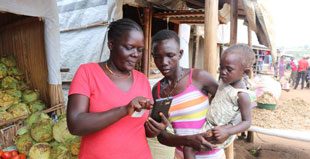
COMMENT | RICHARD OMONGOLE | Uganda’s post-Coronavirus economic failings are going to come from the IMF/World Bank supervised theoretical economists at Bank of Uganda. You borrow $491.5 million, then a mere $151m goes to budget support and Uganda Development Bank (UDB). A whole $340m is retained by Bank of Uganda to stabilize the exchange rate!
This, in my view, is textbook economics based on purely western perceptions of how African economies should run.
Most of the countries in the West have released billions and trillions of dollars directly to SMEs , manufacturers, agriculture, businesses, airlines, hotels etc to quickly revive their economies. We, who are copying the Capitalist West, are clearly copying very poorly.
For the last 30 years of my adult life, I have heard, read and known Bank of Uganda to spend millions or even billions of dollars in stabilizing exchange rates… but Wapi! The shilling keeps running upwards – towards heaven.
Seven Uganda shilling for a dollar
In 1979, during the worst economic times in the country, the shilling was about 7 (seven) shillings to a dollar, largely because of the large agricultural exports from coffee, cotton to tea etc.
The currency reform came in 1987 and again the shilling was put at about 7 (seven) shillings to a dollar.
The shilling thereafter started sliding back because of lack of export earnings to support it. In fact the country went into high speed, replacing even the little exports with a total import-led economy, as all industries, plus agricultural exports collapsed.
Bank of Uganda then embarked on the so called exchange rate stabilization. But like they say, they were “doing the same thing so many times and expecting different results.” Today , the shilling to dollar is sh3,900 to one dollar, a near 1000% devaluation of the shilling.
Now, after the Coronavirus lockdown devastated the economy, Bank of Uganda runs to its supervisor, the IMF and borrows nearly $500m to stabilize exchange rates. What kind of economics is this!
As a farmer, whose poultry farm has suffered heavily due to Coronavirus effects, I listened recently to the President bragging about recapitalizing UDB. I got some relief that many of us the farmers, and all those playing part both in the employment sector and direct economic contribution, would run to UDB and borrow to directly stimulate the economy – or so we thought.
The theoretical economist at Bank of Uganda, had different ideas!
The country is crying for an economic stimulus that will spur agricultural exports and agro based industries to bring in the much desired forex, but Bank of Uganda economists think first exhausting the forex reserves and borrow to stabilize exchange rates, is the best way to rejuvenate the collapsing economy!
Isingoma and his cassava lessons
Now, I actually believe the Bunyoro/Tooro based cassava farmer called Isingoma I met over a decade ago.
Around 2009 or 2010, Bank of Uganda sent me an invitation to attend a workshop – of course IMF/ World Bank facilitated, at Munyonyo. The workshop was largely for farmers and banks. Many of us poultry and crop farmers attended as Bank of Uganda/World Bank were looking for ways to increase agricultural funding.
At the group stage discussions, a white man from probably the World Bank kept moving around groups and telling us to come up with an idea of small cluster farming groups of five farmers all over the country, so as to spur commercial agriculture.
Mr Isingoma, a farmer from Western Uganda who had over 500 acres of cassava, and was selling cassava cuttings to South Sudan, told me aside, as we sipped the tea and coffee provided, that “these guys at Bank of Uganda and World Bank seem to know nothing about agriculture and its importance to the Ugandan economy. ”
He wondered how, a large scale farmer like he was, who should be supported with mechanization is now being told to go down and look for four other farmers to cluster and get some little assistance as if he was a subsistence farmer? He struck down the idea and so did most of the participants.
Isingoma also narrated about an agricultural extension officer from his are, who had never visited his massive cassava farm, but who had heard a lot about it. He one time came looking for him. On his way, he finds someone whose Land Rover had broken down.
The extension worker stopped to ask for directions to Isingoma’s farm. The person who’s Land Rover had broken down, was Isingoma himself.
To him, that kind of ignorance by an official meant to provide him with agricultural extension services, defined the problems agriculture was facing in the country. It was similar to Bank of Uganda going to farmers with complete lack of the reality.
Insingoma also told me how one time, agricultural officials were all running to his farm to book cassava cuttings, but unfortunately both the cassava in the ground and cuttings had been paid up front by South Sudanese.
Bank of Uganda and World Bank/IMF left the Munyonyo Workshop without getting the farmers to support their very unrealistic solution to commercialize agriculture and provide it the most needed credit. They came with their preconceived ideas, and hardly took up the real experiences and proposals from us the farmers.
In the same workshop, one Ugandan and former agriculture minister Victoria Ssekitoleko, who were from the FAO regional headquarters for East and Southern Africa, castigated Bank of Uganda and government for ignoring agriculture in the country in accordance with the Maputo Declaration that hoped that governments in Africa would put 15% off their national budgets to agriculture.
The FAO officials accused Bank of Uganda and government for loving talk shops that promise a lot to agriculture, but doing nothing in the end. I remember telling the Ugandan gentleman who was highly placed at FAO that I wished he was my uncle! The whole hall burst out in laughter and during the break, they only remembered me for that, and not my pleas for agricultural funding.
Banks lend mainly to Indian businessmen to import agric tools
Bank of Uganda, after a number of similar workshops decided to give some money to the banks to lend to farmers. Unfortunately, as I have always told Bank of Uganda officials at such workshops and agricultural shows in Namboole stadium, the money in the banks is largely lent by the banks to Indians.
The Indians borrow it to buy agricultural equipment from India and other Asian countries at low prices, come to Uganda and enjoy tax free importation of agricultural tools, but sell them to Ugandans at 5 -10 times the cost price.
The banks fear lending the money to Ugandans who don’t have good cash flows as farmers or out rightly lack titled securities.
Last year at Namboole again, I raised the matter with Bank of Uganda officials. This time I met my old friend, Mr Kizito, the BOU PRO who gave me his card and assured me that I call him if I encountered problems with the agricultural facility at the banks.
When I moved to the dfcu Bank stall, a young man marketing the dfcu Bank facilities seemed to prefer to market their commercial and salary loans. We had a discussion on the agricultural facility but he confirmed my usual fears. The facility is available to largely importers of agricultural tools, in fact traders of agricultural tools with good cash flows who are largely Asian and Chinese traders.
Believing that the facility is really meant to benefit the ordinary farmer, who needed cheap credit at 10% and not the high commercial rate of between 30- 60% depending on whether you are borrowing from bank or micro finance, I approached UDB for the cheap agricultural credit to buy chicken layer cages, milling and feed mixing machines and a truck for ease of transport at my farm.
A proposal was done, evaluations and field visits and I even got assurances that the proposal and the project were all ok. I waited for a call to sign the loan contract, but none came.
Later I met a friend who had gone through the same but was given very little of what he asked. He told me… “my brother, forget. UDB has no money.”
When I mentioned that to UDB officials, the lady looked down and had no answer. I knew my friend was right. It took UDB over three months to give me an answer. The officials fast told me they were waiting for more government funding or further capitalization before finally telling me, “man first try and do it yourself, we will come in later.”
In the papers yesterday, I saw a UDB extract of financial statements, and phew!
The national development bank had total assets of 486 billion shillings, roughly $130m. It had made a profit of about 10bn roughly $3m. I laughed, instead of crying for Uganda. The national development bank has dollars 130 million as total assets? How will that bank spur development?
That is what one or two serious factories or export oriented agro – industrial farmers needs to produce, add value and export mayonnaise from eggs.
In fact that’s not even the worth of one of the many football players in Europe, yet total assets of a bank meant to fund development in the country is not even equated to the worth of David Beckham.
So when the same paper had bank of Uganda officials explaining that the $491m was to cushion the shilling and not to seriously recapitalize UDB for post coronavirus recovery, I knew the country was simply heading back to its usual rhetoric of agricultural commercialization as the theoretical economist at Bank of Uganda regurgitates textbook theories with the IMF/World Bank dose.
With Bank of Uganda not even advising the government to settle the domestic arrears it owes the local businesses, Ugandans should brace themselves for austerity measures, courtesy of IMF through Bank of Uganda – not economic recovery, as threatened by the president.
These are my views as a Ugandan farmer and a lawyer suffering losses brought about by the lockdown, not as an economist.
*****
Richard Omongole is a Ugandan farmer and lawyer
 The Independent Uganda: You get the Truth we Pay the Price
The Independent Uganda: You get the Truth we Pay the Price



